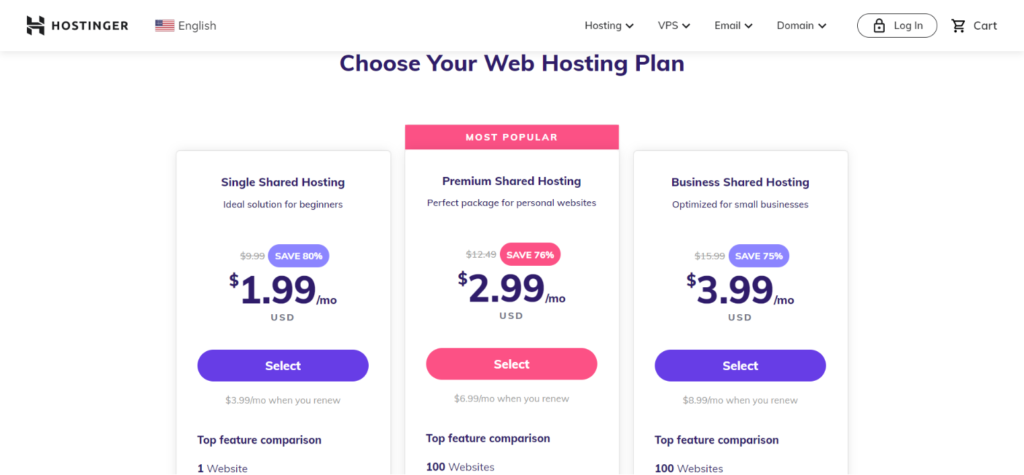Web hosting is an essential aspect of creating and maintaining a website. A web host provides the necessary infrastructure to store your website’s data and make it accessible to visitors.
With so many web hosting providers available, it can be challenging to choose the right one for your website. This article will provide an overview of the top ten web hosting providers in 2024
, including Bluehost, SiteGround, HostGator, A2 Hosting, InMotion Hosting, DreamHost, Hostinger, GreenGeeks, WP Engine, and Liquid Web.
Understanding the Basics.
There are various types of web hosting services available, ranging from shared hosting to dedicated hosting. Shared hosting is the most popular type of web hosting, as it is affordable and ideal for small businesses and personal websites.
On the other hand, dedicated hosting is more expensive and suitable for large businesses that require high levels of security and performance. Additionally, there are other types of web hosting services, such as cloud hosting, VPS hosting, and reseller hosting, which offer unique features and benefits.
Key Takeaways
- There are various types of web hosting services available, ranging from shared hosting to dedicated hosting.
- Web hosting providers offer space on their servers to store website files and data, which can be accessed by anyone with an internet connection.
- Different web hosting services offer unique features and benefits that cater to the needs of different businesses and individuals.
Types of Web Hosting
When it comes to web hosting, there are several types to choose from, each with its own advantages and disadvantages. Here are five of the most common types of web hosting:
VPS Hosting
VPS, or Virtual Private Server, hosting is a type of web hosting that combines the features of both shared and dedicated hosting. With VPS hosting, a physical server is divided into multiple virtual servers, each with its own resources and operating system. This allows for greater flexibility and control over the server environment, making it a popular choice for businesses and individuals who require more resources than shared hosting can provide.
Shared Hosting
Shared hosting is the most common type of web hosting, and it is often the most affordable option. With shared hosting, multiple websites are hosted on the same server, sharing its resources such as RAM and CPU. While this can be a cost-effective solution for small websites, it can also lead to slower load times and decreased performance during traffic spikes.
Dedicated Hosting
Dedicated hosting is a type of web hosting where a single server is dedicated to one website or application. This means that all of the server’s resources are dedicated to that website, providing maximum performance and flexibility. Dedicated hosting is a popular choice for businesses and organizations that require high levels of security, reliability, and customization.
Cloud Hosting
Cloud hosting is a type of web hosting that utilizes multiple servers to host websites and applications. This allows for greater scalability and flexibility, as resources can be added or removed as needed. Cloud hosting is a popular choice for businesses and organizations that require high levels of uptime and performance, as well as the ability to scale quickly and easily.
Managed Hosting
Managed hosting is a type of web hosting where the hosting provider takes care of all server maintenance and management tasks, including security, backups, and updates. This allows website owners to focus on their business or organization, rather than worrying about server maintenance. Managed hosting is a popular choice for businesses and organizations that require high levels of uptime and security, as well as those who lack the technical expertise to manage their own servers.
Web Hosting Features
When choosing a web hosting provider, it is important to consider the features that they offer. Here are some of the key features to look for:
Disk Space and Bandwidth
Disk space refers to the amount of storage space that is available for your website’s files, while bandwidth refers to the amount of data that can be transferred from your website to your visitors. It is important to choose a web hosting provider that offers enough disk space and bandwidth to accommodate your website’s needs.
Uptime and Reliability
Uptime refers to the amount of time that your website is available and accessible to visitors. It is important to choose a web hosting provider that offers high uptime rates, as a website that is frequently down can result in lost traffic and revenue. Reliability is also important, as a reliable web hosting provider will ensure that your website is always up and running smoothly.
Security Measures
Security is a crucial aspect of web hosting, as a compromised website can result in lost data, revenue, and reputation. Look for a web hosting provider that offers robust security measures, such as firewalls, malware scanning, and SSL certificates.
Scalability Options
As your website grows, you may need to scale up your web hosting plan to accommodate increased traffic and data. Look for a web hosting provider that offers scalability options, such as the ability to upgrade to a higher-tier plan or to add additional resources as needed.
Overall, choosing a web hosting provider with the right features is crucial to the success of your website. By considering factors such as disk space and bandwidth, uptime and reliability, security measures, and scalability options, you can ensure that your website is hosted on a reliable and secure platform that can accommodate your needs both now and in the future.
Domain Names and Management
A domain name is the address of a website, which helps users to find it on the internet. It is the unique identity of a website that distinguishes it from others. Domain names consist of two parts: the name itself and the extension. For example, in the domain name “google.com,” “google” is the name and “.com” is the extension.
Domain name management refers to the process of choosing, registering, and maintaining a domain name for a website. It is essential to choose the right domain name that represents the website’s brand and is easy to remember. The process of domain name management includes:
- Domain Name Registration: The first step in domain name management is to register the domain name with a domain registrar. There are several domain registrars available, such as GoDaddy, Namecheap, and Domain.com.
- Domain Name Renewal: Domain names need to be renewed periodically, usually once a year. It is essential to keep track of the renewal date to avoid losing the domain name.
- Domain Name Transfer: Domain names can be transferred from one registrar to another. It is necessary to follow the transfer process carefully to avoid any downtime or loss of data.
- Domain Name System (DNS) Management: DNS management involves configuring the DNS settings to point the domain name to the correct IP address of the website’s server. It is crucial to keep the DNS settings up-to-date to ensure the website is accessible.
It is essential to manage domain names carefully to avoid any issues that may affect the website’s availability or reputation.
Content Management Systems
A content management system (CMS) is a software application that allows users to create, manage, and publish digital content on the web without requiring technical knowledge. CMS platforms are essential for building and maintaining websites, and they offer a range of features to help users create and manage their content effectively.
WordPress Hosting
WordPress is the most popular CMS platform in the world, powering over 40% of all websites on the internet. It is an open-source platform that provides users with a range of features and tools to create and manage their content. WordPress hosting is available from a range of providers, and it typically includes a range of features such as automatic updates, security, and backups.
Joomla Hosting
Joomla is another popular CMS platform that is used by millions of websites around the world. It is an open-source platform that offers a range of features and tools to help users create and manage their content. Joomla hosting is available from a range of providers, and it typically includes a range of features such as automatic updates, security, and backups.
Drupal Hosting
Drupal is a powerful CMS platform that is used by some of the world’s largest websites. It is an open-source platform that offers a range of features and tools to help users create and manage their content. Drupal hosting is available from a range of providers, and it typically includes a range of features such as automatic updates, security, and backups.
Overall, CMS platforms are essential for building and maintaining websites, and they offer a range of features to help users create and manage their content effectively. Whether you choose WordPress, Joomla, Drupal, or another CMS platform, it’s important to choose a hosting provider that offers reliable and secure hosting services.
E-commerce Hosting
E-commerce hosting is a type of web hosting service that is designed specifically for online stores. It offers features that are essential for running an e-commerce website, such as shopping cart integration, payment processing, and SSL certificates. In this section, we will discuss these features in detail.
Shopping Cart Integration
A shopping cart is a software application that allows customers to select and purchase products from an online store. It is an essential component of any e-commerce website. E-commerce hosting providers offer various shopping cart solutions that can be integrated into your website. Some popular shopping cart software includes WooCommerce, Magento, and Shopify.
WooCommerce is a free and open-source shopping cart plugin for WordPress. It is easy to use and offers a wide range of features, including inventory management, tax and shipping options, and payment gateways. Magento is a powerful e-commerce platform that is designed for large online stores. It offers advanced features such as multi-store support, product bundling, and customer segmentation. Shopify is a hosted e-commerce platform that is easy to set up and use. It offers a range of features such as customizable themes, abandoned cart recovery, and fraud analysis.
Payment Processing
Payment processing is the process of accepting and processing payments from customers. E-commerce hosting providers offer various payment processing solutions that can be integrated into your website. Some popular payment gateways include PayPal, Stripe, and Authorize.net.
PayPal is a widely used payment gateway that allows customers to pay using their PayPal account or credit card. It offers a range of features such as fraud protection, chargeback protection, and recurring payments. Stripe is a payment gateway that allows customers to pay using their credit card. It offers a range of features such as customizable checkout, subscription billing, and fraud protection. Authorize.net is a payment gateway that allows customers to pay using their credit card. It offers a range of features such as recurring billing, fraud detection, and chargeback prevention.
In conclusion, e-commerce hosting is essential for running an online store. It offers features such as shopping cart integration, payment processing, and SSL certificates that are essential for running an e-commerce website. When choosing an e-commerce hosting provider, it is important to consider factors such as uptime, security, and customer support.
Email Hosting
Email hosting is a crucial aspect of web hosting, and it is essential to choose a reliable email hosting service that meets your business needs. This section will discuss the two most important aspects of email hosting: email accounts and spam protection.
Email Accounts
When choosing an email hosting service, it is important to consider the number of email accounts you need. Most email hosting services offer different plans with varying numbers of email accounts, so you can choose the one that best fits your needs. For example, A2 Hosting offers unlimited email accounts with its shared hosting plans, while Hostinger offers up to 100 email accounts with its Business Shared Hosting plan.
Another important consideration when choosing an email hosting service is the type of email client you want to use. Most email hosting services support popular email clients like Gmail, Outlook, and Webmail, and some even offer desktop client applications. It is also important to choose a service that offers secure access using passwords and encrypted connections to ensure the privacy and security of your emails.
Spam Protection
Spam is a major issue for email users, and it is important to choose an email hosting service that provides effective spam protection. Most email hosting services offer spam filters that use advanced algorithms to detect and block spam emails. For example, Microsoft 365 offers advanced spam protection with its Exchange Online Protection service, which uses machine learning and heuristics to detect and block spam emails.
In addition to spam filters, some email hosting services also offer other security features like virus scanning and malware protection. For example, Fastmail offers virus scanning and malware protection for all incoming and outgoing emails to ensure the security of your emails.
In conclusion, when choosing an email hosting service, it is important to consider the number of email accounts you need and the type of email client you want to use. It is also important to choose a service that offers effective spam protection and other security features to ensure the privacy and security of your emails.
Key Takeaways
- Each provider offers its own unique features, advantages, and pricing plans, making it essential to compare and contrast the various hosting plans, pricing, performance, uptime, security, ease of use, and customer support.
- Choosing the right web hosting provider is crucial for the success of your website, and understanding the differences between them can help you make an informed decision.
Understanding Web Hosting

When it comes to choosing a web host, it can be overwhelming to sort through all the options available. However, there are certain factors to consider that can help narrow down the choices and find the best fit for your website.
First and foremost, it’s important to consider the specific needs of your website. For example, if you’re running a WordPress site, you may want to look for a host that specializes in WordPress hosting, such as WP Engine or SiteGround. On the other hand, if you’re running an e-commerce site, you may want to prioritize a host that offers robust security features, such as Bluehost or InMotion Hosting.
Another important factor to consider is pricing. While it may be tempting to go with the cheapest option, it’s important to keep in mind that the cheapest option may not always be the best value. For example, Hostinger offers very low prices, but may not offer as many features or as reliable performance as some of the other hosts on this list.
Reliability and uptime are also crucial factors to consider when choosing a web host. After all, if your website is frequently down or experiences slow load times, it can have a negative impact on user experience and ultimately hurt your bottom line. SiteGround, A2 Hosting, and Liquid Web are all known for their reliable performance and uptime.
Ultimately, choosing a web host requires careful consideration of your website’s specific needs, as well as factors such as pricing, reliability, and performance. By taking the time to research and compare different hosts, you can find the best fit for your website and set yourself up for success.
Bluehost Overview:

Bluehost is a web hosting company that has been in business since 2003. They offer a wide range of hosting services, including shared hosting, VPS hosting, and dedicated hosting. Their shared hosting plans are affordable and come with a variety of features, including unlimited bandwidth, a free domain name for the first year, and a free SSL certificate.
Bluehost’s VPS hosting plans are also affordable and come with a variety of features, including root access, guaranteed resources, and instant provisioning. They also offer managed WordPress hosting, which is optimized for WordPress websites and comes with features like automatic updates and site backups.
In terms of customer support, Bluehost offers 24/7 support via phone, live chat, and email. They also have a knowledge base that contains articles, tutorials, and FAQs to help customers troubleshoot issues on their own.
Overall, Bluehost is a reliable and affordable web hosting provider that offers a variety of hosting options for businesses and individuals alike. Their customer support is top-notch, and they offer a variety of features to help customers get their websites up and running quickly and easily.
SiteGround Advantages:


SiteGround is a popular web hosting provider that offers a range of hosting solutions for businesses and individuals. Here are some of the advantages of using SiteGround:
1. Fast Loading Speeds
SiteGround is known for its fast loading speeds. The company uses the latest technology and hardware to ensure that websites hosted on its platform load quickly. In fact, according to a comparison by TechRadar, SiteGround outperforms Bluehost in terms of loading speeds.
2. Reliable Uptime
SiteGround guarantees an uptime of 99.9%. This means that websites hosted on its platform will be up and running almost all the time. SiteGround uses a range of measures to ensure that its servers are always up and running, including regular maintenance and security updates.
3. Excellent Customer Support
SiteGround is known for its excellent customer support. The company offers 24/7 support via live chat, phone, and email. SiteGround also has an extensive knowledge base that contains articles and tutorials on a range of topics related to web hosting.
4. Free SSL Certificates
SiteGround offers free SSL certificates to all its customers. SSL certificates help secure websites and protect sensitive information such as passwords and credit card numbers. With SiteGround, customers don’t have to pay extra for SSL certificates.
5. Multiple Data Centers
SiteGround has data centers located in different parts of the world. This means that customers can choose a data center that is closest to their target audience. SiteGround’s data centers are located in the US, Europe, and Asia.
Overall, SiteGround is a reliable and fast web hosting provider that offers excellent customer support and a range of hosting solutions.
HostGator Features:

HostGator is a popular web hosting provider that offers a wide range of hosting services to suit different needs and budgets. Here are some of the key features of HostGator:
- 99.9% Uptime Guarantee: offers a 99.9% uptime guarantee, which means that your website will be up and running almost all the time.
- 24/7 Customer Support: provides round-the-clock customer support via phone, email, and live chat.
- Flexible Hosting Plans: offers a variety of hosting plans, including shared hosting, VPS hosting, dedicated hosting, and WordPress hosting. This makes it easy for users to find a plan that suits their needs and budget.
- Free Website Transfer: offers free website transfer for new customers who want to switch from another hosting provider.
- cPanel Control Panel: uses cPanel, a popular control panel that makes it easy for users to manage their website and hosting account.
- One-Click Installs: offers one-click installs for popular applications like WordPress, Joomla, and Drupal.
- Unlimited Bandwidth and Storage: HostGator offers unlimited bandwidth and storage on all its hosting plans, which means that users don’t have to worry about running out of space or bandwidth.
Overall, HostGator is a reliable and feature-rich web hosting provider that offers a range of hosting plans to suit different needs and budgets. With its 99.9% uptime guarantee, 24/7 customer support, and easy-to-use cPanel control panel, is a great choice for users who want a hassle-free hosting experience.
A2 Hosting Services:

A2 Hosting is a web hosting company that offers a range of hosting services, including shared hosting, VPS hosting, dedicated hosting, and reseller hosting. Their hosting plans come with unlimited storage and bandwidth, free SSL certificates, and a 30-day money-back guarantee.
Shared Hosting
A2 Hosting’s shared hosting plans are suitable for small to medium-sized websites. They offer three shared hosting plans: Startup, Drive, and Turbo Boost. The Startup plan is the cheapest and offers one website, 100 GB SSD storage, and unlimited bandwidth. The Drive plan offers unlimited websites, unlimited SSD storage, and unlimited bandwidth. The Turbo Boost plan offers the same features as the Drive plan but with faster servers.
VPS Hosting
A2 Hosting’s VPS hosting plans are suitable for websites that require more resources than shared hosting can provide. They offer three VPS hosting plans: Unmanaged VPS, Managed VPS, and Core VPS. The Unmanaged VPS plan is the cheapest and offers root access, 20 GB storage, and 2 TB transfer. The Managed VPS plan offers the same features as the Unmanaged VPS plan but with managed support. The Core VPS plan offers more resources and features than the Managed VPS plan.
Dedicated Hosting
A2 Hosting’s dedicated hosting plans are suitable for websites that require a lot of resources. They offer three dedicated hosting plans: Sprint, Exceed, and Mach. The Sprint plan is the cheapest and offers an Intel Xeon 4-Core CPU, 8 GB RAM, 2 x 500 GB storage, and 10 TB transfer. The Exceed plan offers more resources and features than the Sprint plan. The Mach plan offers the most resources and features.
Reseller Hosting
A2 Hosting’s reseller hosting plans are suitable for people who want to start their own web hosting business. They offer four reseller hosting plans: Bronze, Silver, Gold, and Platinum. The Bronze plan is the cheapest and offers 30 GB storage, 400 GB transfer, and 40 accounts. The Platinum plan offers the most resources and features.
Overall, A2 Hosting offers a range of hosting services that cater to different types of websites and budgets. Their hosting plans come with a 30-day money-back guarantee, which gives customers peace of mind.
InMotion Hosting Benefits:

InMotion Hosting is a popular web hosting provider that is known for its reliable and fast hosting services. The company has been in the business for over 20 years, and during this time, it has built a reputation for providing top-notch hosting services to its customers. Here are some of the benefits of using InMotion Hosting:
1. High Uptime Guarantee
One of the biggest benefits of using InMotion Hosting is its high uptime guarantee. The company offers a 99.9% uptime guarantee, which means that your website will be up and running almost all the time. This is important because if your website is down, you could lose potential customers and revenue.
2. Fast Loading Speeds
InMotion Hosting is known for its fast loading speeds. The company uses SSD storage, which is much faster than traditional hard drives. This means that your website will load quickly, which is important for user experience and search engine optimization.
3. Excellent Customer Support
InMotion Hosting offers excellent customer support. The company has a team of experts who are available 24/7 to help you with any questions or issues you may have. You can reach them via phone, email, or live chat.
4. Free Website Migration
If you are currently using another web hosting provider and want to switch to InMotion Hosting, the company offers free website migration. This means that they will transfer your website to their servers for you, so you don’t have to worry about any technical details.
5. Multiple Hosting Plans
InMotion Hosting offers multiple hosting plans to choose from, including shared hosting, VPS hosting, and dedicated hosting. This means that you can choose the plan that best fits your needs and budget.
Overall, InMotion Hosting is a reliable and fast web hosting provider that offers excellent customer support and multiple hosting plans to choose from. If you are looking for a web hosting provider, InMotion Hosting is definitely worth considering.
DreamHost Offerings:

DreamHost is a web hosting provider that has been around since 1996. They offer a range of hosting plans to suit different needs. Below are some of the key offerings of DreamHost:
Shared Hosting
DreamHost offers shared hosting plans that are suitable for small businesses and individuals. Their shared hosting plans come with unlimited bandwidth, a free domain name, and a free SSL certificate. They also offer a one-click installer for popular CMS platforms like WordPress, Joomla, and Drupal.
VPS Hosting
For those who need more resources and control over their hosting environment, DreamHost offers VPS hosting plans. Their VPS hosting plans come with SSD storage, unlimited bandwidth, and a free SSL certificate. Users can choose from different levels of resources, including RAM, CPU, and storage, to match their needs.
Dedicated Hosting
For users who need even more resources and control, DreamHost offers dedicated hosting plans. Their dedicated hosting plans come with a choice of Linux or Windows operating systems, SSD storage, and unlimited bandwidth. Users can also choose from different levels of resources, including RAM, CPU, and storage, to match their needs.
WordPress Hosting
DreamHost offers managed WordPress hosting plans that are optimized for WordPress websites. Their WordPress hosting plans come with automatic WordPress updates, a custom control panel, and a free SSL certificate. They also offer a one-click installer for WordPress and a free migration service for those who want to move their existing WordPress site to DreamHost.
Cloud Hosting
For users who need scalability and flexibility, DreamHost offers cloud hosting plans. Their cloud hosting plans come with SSD storage, unlimited bandwidth, and a free SSL certificate. Users can choose from different levels of resources, including RAM, CPU, and storage, to match their needs. DreamHost’s cloud hosting plans also come with an easy-to-use control panel and a one-click installer for popular CMS platforms like WordPress, Joomla, and Drupal.
Overall, DreamHost offers a range of hosting plans to suit different needs. Their plans come with plenty of features and resources, and their customer support is available 24/7 via live chat and email.
Hostinger Plans:

Hostinger offers a range of hosting plans to suit different needs and budgets. Their plans are affordable and come with a variety of features to help you get started with your website.
Shared Hosting
Hostinger’s shared hosting plans are perfect for individuals and small businesses who are just starting out. Their plans start at just $1.99 per month, and include a free domain name, website builder, and advanced tools to help you build a fully functional website.
VPS Hosting
For those who need more power and flexibility, Hostinger offers VPS hosting plans starting at $3.95 per month. Their VPS plans come with dedicated resources, full root access, and a choice of operating systems.
Cloud Hosting
Hostinger’s cloud hosting plans are designed for websites that require high availability and scalability. Their plans start at $7.45 per month and include a dedicated IP address, free domain name, and automatic backups.
WordPress Hosting
Hostinger offers optimized WordPress hosting plans starting at $2.15 per month, which include a pre-installed WordPress CMS, free domain name, and automatic updates.
Hostinger’s plans are affordable and come with many features to help you get started with your website. Whether you are looking for shared hosting, VPS hosting, cloud hosting, or WordPress hosting, Hostinger has a plan to suit your needs.
Each of these web hosting providers has its own unique features, advantages, and pricing plans. Understanding the differences between them can help you make an informed decision about which one is right for your website. In this article, we will compare and contrast the various hosting plans, pricing, performance, uptime, security, ease of use, and customer support offered by each provider.





Wow
An interesting topic and I’m glad to come across your page where I found some helpful insights. Check out my website 48U too, if you need additional resources about Airport Transfer.